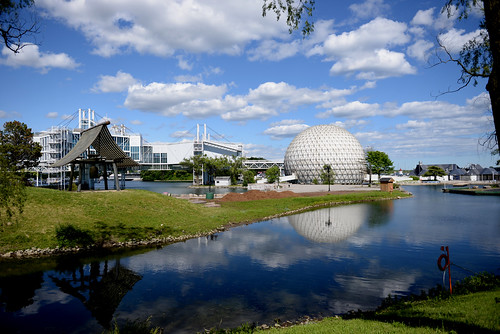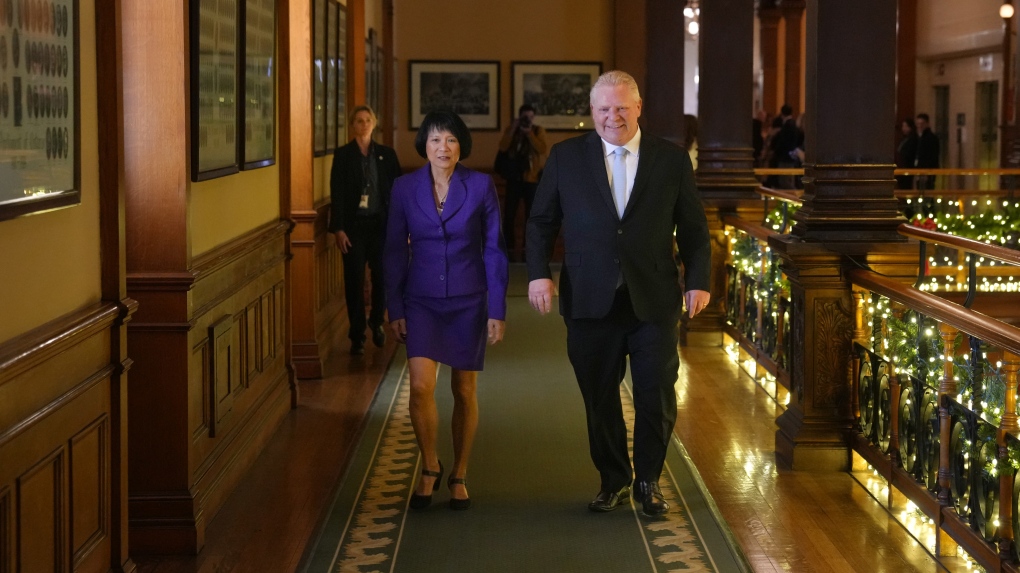Province takes over Gardiner Expressway, DVP for control over Ontario Place in new deal with Toronto
Ontario Place #OntarioPlace

The Doug Ford government will take responsibility for the Gardiner Expressway and the Don Valley Parkway from Toronto, potentially saving the city billions of dollars.
In exchange, the city has agreed not to stand in the province’s way as it moves forward with the planning approvals necessary to overhaul Ontario Place.
The trade is part of a new deal between the provincial and municipal government meant to address Toronto’s financial woes. In total, the agreement will provide the city with up to $1.2 billion in financial relief over three years. The city is facing a $1.5 billion shortfall in its 2024 budget alone.
A large part of the agreement will see the cost of maintaining and repairing two of Toronto’s major roadways shift back to the provincial government. Speaking at a news conference on Monday, Premier Doug Ford said that uploading the Gardiner Expressway and the DVP could provide Toronto with $7.6 billion in capital relief.
“These two highways are vital to the success of the province’s economy,” Ford said. “This deal will ensure that these critical transportation assets remain in good condition to keep people and goods living for generations to come.”
Ford also pledged not to toll either roadway. The City of Toronto attempted to introduce tolls on the highways back in 2016 but the move was blocked by the then Liberal government.
Earlier this year, city staff said that $500 million in contracts had already been awarded to rebuild the 1.7-kilometre eastern portion of the Gardiner and an additional $650 million in contracts will be included in capital plans.
The portion of the Gardiner Expressway from Highway 427 to the Humber River used to be operated by the province as part of the Queen Elizabeth Way until the Mike Harris government offloaded the costs to the city in 1997 as a cost-saving measure for Ontario.
WHAT’S HAPPENING WITH ONTARIO PLACE
The deal also gives the Ford government a win in their fight to transform Toronto’s waterfront.
The city has agreed to give the province “authority to advance project approvals for Ontario Place.” Toronto Mayor Olivia Chow confirmed during the news conference that council will be ceding city-owned land to the province for the redevelopment and will stand out of Ford’s way on plans for the area.
The trade represents a backtrack for Chow, who suggested during her 2023 election campaign that she would withhold the parcel of land to prevent the province from moving ahead with the building of a large private spa in the area.
At the same time, the Ford government made it clear they were prepared to expropriate the land if the city didn’t concede it.
Toronto’s mayor said on Monday that while she would like to see the space used for a public park, the area is “called Ontario Place” and she won’t fight Ford on it.
“The land belongs to the provincial government and we do not have the authority to stop the development,” she told reporters. “The future of Ontario Place, that debate is going to happen here at Queen’s Park, not at the municipal level.”
 Ontario Premier Doug Ford and Toronto Mayor Olivia Chow return from a news conference in Toronto on Monday Nov. 27, 2023. THE CANADIAN PRESS/Chris Young
Ontario Premier Doug Ford and Toronto Mayor Olivia Chow return from a news conference in Toronto on Monday Nov. 27, 2023. THE CANADIAN PRESS/Chris Young
The province said they still plan on moving the Ontario Science Centre to the waterfront as part of its redevelopment, but it pledged to “respect the legacy” of the museum and educational centre.
Chow said she hopes to maintain “public, community-oriented science programming at the existing Ontario Science Centre” in partnership with the province. When asked by a reporter, the mayor confirmed they would not be using the land for housing.
It’s unclear what this means for the original location of the Science Centre in North York.
NEW FUNDING FOR TORONTO LRTs
The new deal will also provide the city with $330 million over three years to operate the Eglinton Crosstown LRT and the Finch West LRT.
Documents obtained by CTV News Toronto suggested that the city was considering an “indefinite deferral” of the operation of both projects due to the financial toll it would bring.
The province, for its part, noted that if there is no new intergovernmental funding, they may have to take over operation of the lines completely.
The province will also spend $750 million in funding for 55 new subway trains for Toronto’s Bloor-Danforth Line—although they specified this was conditional on matching federal support. An additional $300 million in one-time funding will also be provided for transit safety projects.
In exchange for all of these terms, as well as $600 million in additional operating support for shelters and homelessness, the city has agreed to meet or exceed provincial housing targets.
This means that Toronto has pledged to build more than 74,000 homes by 2025, with a focus on transit density.
Chow has also said the city has agreed to continue and find efficiencies in service delivery and procurement.
The city was, prior to this agreement, exploring multiple revenue tools to address its budget shortfall, including a municipal sales taxes, an increase of the vacant home tax, and a commercial parking levy.
All of these changes will be outlined in the New Deal for Toronto Act, which the government hopes to table at the Legislature soon.